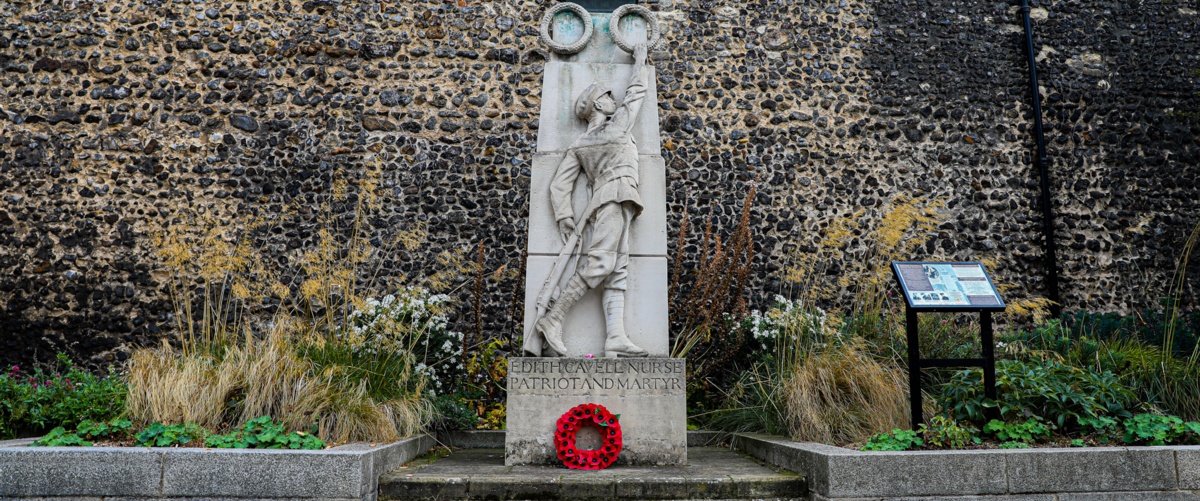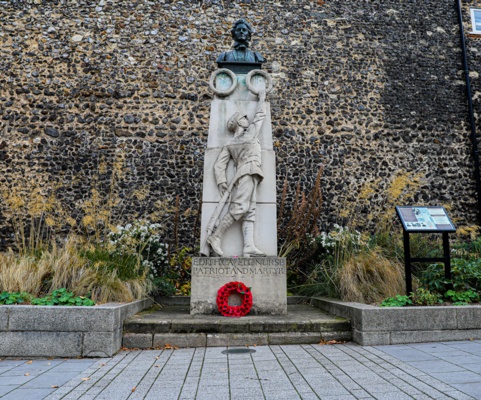In assembly this morning, Rev. Child reflected on the life of Edith Cavell...
It’s the time of year when we remember someone born in Norfolk and educated in Norwich who became a national hero; someone who is remembered in a stone memorial, given a special place just outside the cathedral; someone who is remembered by the whole nation (if you head to Trafalgar Square in London, for instance, you would find a statue there to this person’s memory). This is someone whose bravery in time of war, and whose fearlessness in the face of death, illustrates character and values that we want to go on admiring today.
Those of you who think I am talking about Vice-Admiral Horatio Nelson are a week too early – our Trafalgar Day service will be this time next week. The person I’m talking about is Edith Cavell, the British nurse who is remembered on 12th October, the date of her execution by firing squad during the First World War in 1915. That date is recorded in the Church of England’s calendar; if you had been at a service in here on Wednesday, you would have heard prayers said in memory of Edith Cavell.
She is not one of the official saints, but she is certainly worth remembering, and many of the details of her life come across as saintly. She was a thinking, caring person, who discovered an aptitude for nursing as a result of caring for her father at the end of his life. Despite the entreaties of her family, she exchanged the safety of Norfolk for the danger of occupied Belgium during WWI, because she knew that where the fighting was, her nursing would be most needed. Famously, she treated wounded soldiers from both sides. Whether they were Allies or Germans, they received the same care.
Even the supposed crime she was condemned for by the Germans – helping Allied troops escape over the border to the neutral Netherlands – sounds like the sort of crime a saint would commit.
She approached her own death with generosity of spirit. We know this because on the eve of her execution she was visited by an English clergyman, a friend, who wrote an account of the visit afterwards.
The account of the British clergyman who visited Edith Cavell on the eve of her execution
On Monday evening, October 11th, I was admitted by special passport from the German authorities to the prison of St. Gilles, where Miss Edith Cavell had been confined for ten weeks. The final sentence had been given early that afternoon. To my astonishment and relief I found my friend perfectly calm and resigned. But this could not lessen the tenderness and intensity of feeling on either part during that last interview of almost an hour.
She then added that she wished all her friends to know that she willingly gave her life for her country, and said: “I have no fear nor shrinking; I have seen death so often that it is not strange or fearful to me.”
She further said: “I thank God for this ten weeks’ quiet before the end.” “Life has always been hurried and full of difficulty.” “This time of rest has been a great mercy.” “They have all been very kind to me here. But this I would say, standing as I do in view of God and eternity, I realize that patriotism is not enough. I must have no hatred or bitterness towards any one.”
We partook of the Holy Communion together, and she received the Gospel message of consolation with all her heart. At the close of the little service I began to repeat the words, “Abide with me,” and she joined softly in the end. We sat quietly talking until it was time for me to go. She gave me parting messages for relations and friends. She spoke of her soul’s needs at the moment and she received the assurance of God’s Word…
Then I said “Good-by,” and she smiled and said, “We shall meet again.” The German military chaplain was with her at the end and afterwards gave her Christian burial. He told me: “She was brave and bright to the last. She professed her Christian faith and that she was glad to die for her country.” “She died like a heroine.”
The times and seasons that we’re going through at the moment – Black History Month, Trafalgar, Remembrance after half term – are points in the calendar to understand history and what it has to do with us.
We’re a community that studies history – we have a history department – so it falls to us to do this well, to review history intelligently and wisely. The story of Edith Cavell’s death became known very quickly around the world, and after the war she was given a large public funeral, celebrated as a heroine or a martyr who fell at the hands of the evil Nazis. That’s the popular version of what happened.
Other things are easier to miss – and this is where being careful students of history can help. For instance, the German chaplain is an interesting character in the account we heard. It was the chaplain who realised that, as a German, he wouldn’t be able to offer Edith the same comfort as an Englishman. It was the chaplain who arranged, at short notice, for an Anglican vicar to visit Edith. And it’s thanks to that kindness that we have the vicar’s account that we were able to hear this morning.
All of which prevents us from reaching the quick and easy conclusion that the Germans were all baddies. It’s more complex than that. Edith herself, reluctant to be a saint or a hero or a martyr, would not want us to write off whole groups of people because they are part of a different tribe. Remember that she said at the end: “Patriotism is not enough. I must have no hatred or bitterness towards any one…”
The better we do the history, the more valuable the lessons we learn. Do bear this in mind when we come across other moments of remembering in the calendar – for instance, next week’s Trafalgar service. Over the last three years we have given some close scrutiny to Nelson and Trafalgar, and we have a continuing conversation about how best to mark this day (which our prefects, sixth-formers and history department have all been involved with). This year there will be a few changes to our Trafalgar service so that it is, we hope, truer both to the tradition and to the way we need to look at Nelson in the 21st century.
But all of that is next week. For now, I am going to conclude my thoughts about Edith Cavell with a prayer in her memory. Let us pray.
A prayer in memory of Edith Cavell
Lord, we lift before you all those who speak your name with boldness and seek to do what is right even in the face of death.
Make us bold to seek a world where all may live well without fear of violence.
Lord, hear the prayers of those who stay faithful in dangerous times and in dark valleys, and who die with your name on their lips.
Enfold them in your loving arms, and may we learn from them as we honour their example. Amen.


